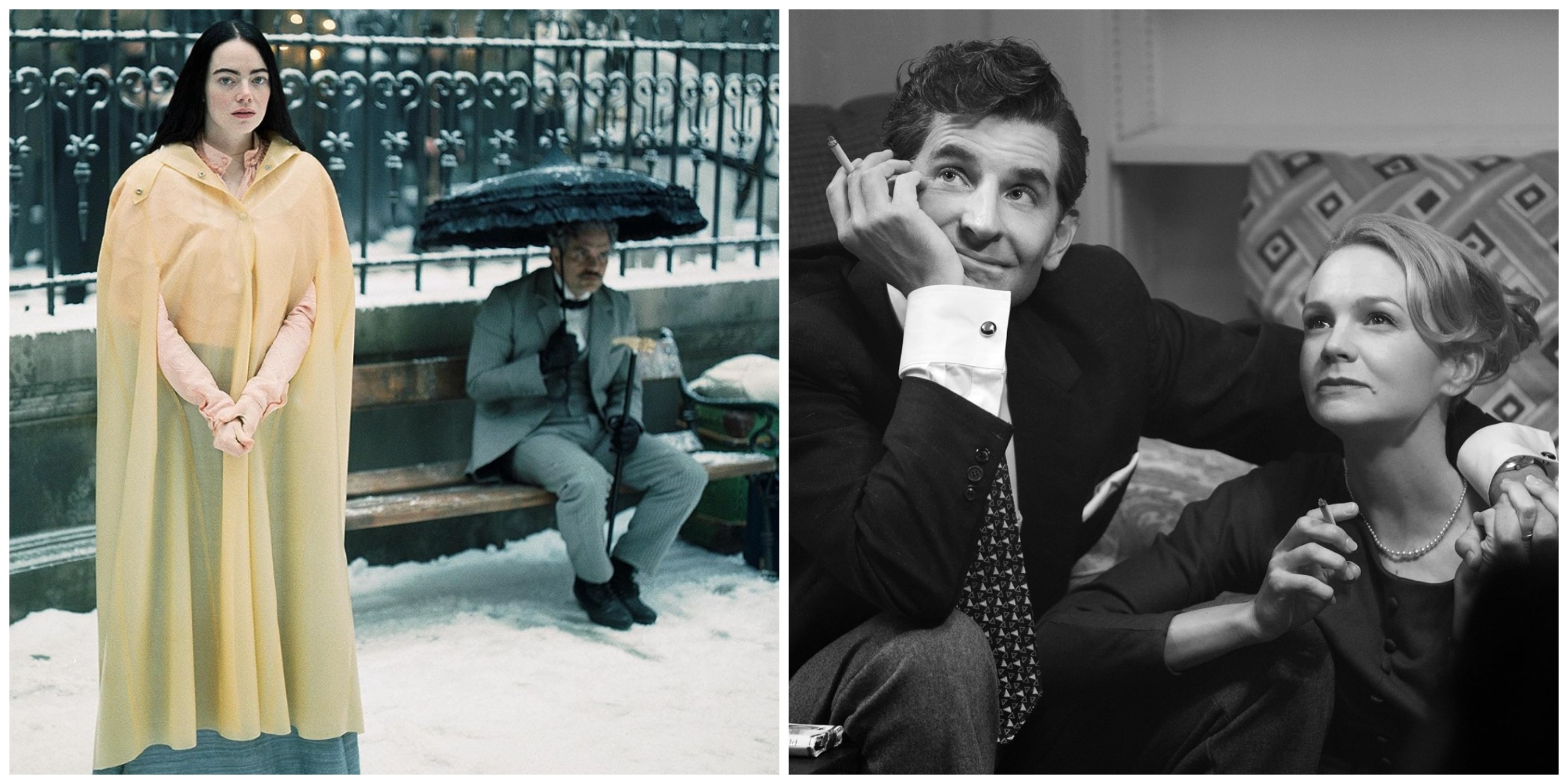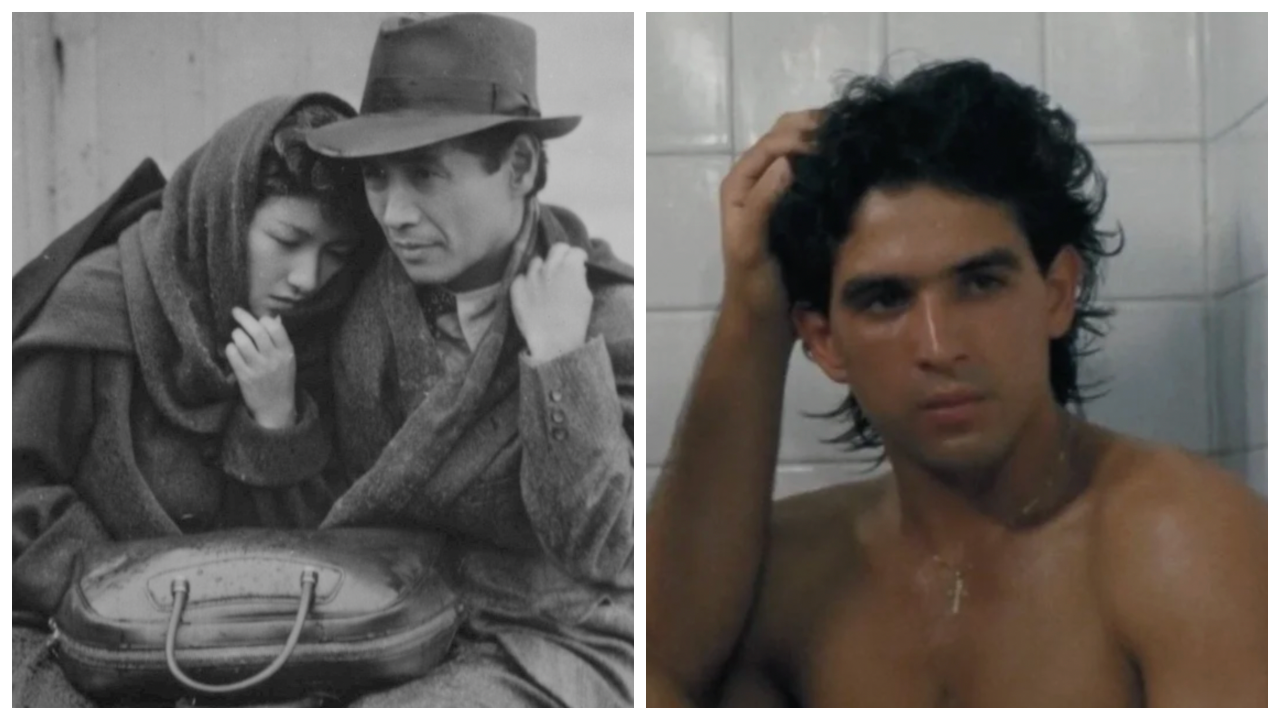Bradley Cooper knows what greatness is. But if that’s all it took to be a great filmmaker, every movie critic in the world (well, the good ones anyway) would be turning out classics. Granted, Cooper is further along than the rest of us—he has technique, formal mastery, and the money to put his plans into effect. Because his Leonard Bernstein biopic Maestro has the shape of greatness, and contains many elements of a great film, it’s already been mistaken for one. I’ll give him this—it fails in ways most biopics wouldn’t even think to attempt.
The earliest scenes here, shot in black and white to give them that “good old days” feel, have a jazzy charm, with Cooper’s Lenny traipsing magically from one scene (and bed) to the next with a rapturous ease of the golden boy he is. Lenny’s involved with clarinetist David Oppenheim (Matt Bomer, whose butt Cooper uses as bongos) when he meets actress Felicia Montealegre (Carey Mulligan) at a party. Bernstein charms her, of course, as he charms everyone, yet cleverly, it’s Felicia who clinches the deal by having him rehearse a scene with her in which she declares her love for him. Soon Lenny ditches Oppenheim and enters something like heterosexual monogamy, though Cooper stages a dream ballet, an interpretation of Jerome Robbins’s Fancy Free, that hints at how Lenny’s desire for men will threaten their bond.
And as Maestro whisks through the latter half of the 20th century and Bernstein’s celebrity star rises, the focus remains on husband and wife. Both publicly and privately, Cooper and Mulligan expertly capture the spoken rhythms of a longtime married couple, and the film charts the increased strain on their marriage as Lenny continues having sex with men. They conduct one coldly polite argument on the patio at their Connecticut place, shot from a distance as if we’re eavesdropping. Not long after, they’re exploding at each other on Thanksgiving, and Felicia warns Lenny, "You’re going to die a lonely, bitter old queen" (a verbatim quote, per their daughter Jamie’s memoir).
Yet there’s a vacuum at the center of Maestro because Cooper’s Lenny skirts the line between expert impression and fully realized character. In part that’s unavoidable: Bernstein was such an external man, performing even in private, he could seem to be impersonating himself. But that should be a challenge for Cooper, not an excuse. At the end of the movie, we feel no closer to Bernstein than when we began, and when Felicia cruelly declares that his art is born not from love, but from hate, we’re left wondering if she’s right.
But don’t wonder too hard—she takes it back, in tears, after Cooper’s big set piece. Felicia is overwhelmed (as we are meant to be) by Bernstein’s greatness when he conducts Mahler’s Symphony No. 2 at Ely Cathedral in England in 1973. His art has conquered her—yuck. Cooper learned to conduct for this six-minute scene, just as he studied guitar for A Star Is Born and learned to dance for the dream ballet (he’s like if Tom Cruise was a nerd) but since the actual concert is on YouTube, you have to ask why he needed to recreate it. Pop guy that I’ll forever be, I’ll take the scores to On the Town and West Side Story (not Candide, sorry) over Mahler any day, but honestly, for anyone who didn’t grow up on Bernstein, his conducting looks a bit hammy in retrospect.
Curiously, since no one ever did more to educate the public about classical music than Bernstein, we don’t get much insight into what conducting means—Tár treats the art of the conductor far more rigorously. The film also ignores the Bernsteins’ left politics, an integral part of their lives. And Mulligan’s opportunity to enact noble suffering during Felicia’s prolonged death from cancer feels cinematically morbid. (“Bye, Felicia,” I couldn’t help but think.) But the film’s biggest flaw is how it slights Bernstein’s bisexuality. Because Maestro focuses on the Bernsteins’ marriage, Lenny’s affairs with men become mere indiscretions, flings, dalliances with pretty boys. Is that truly all they were? And if so, what did they mean to Lenny?
If Cooper’s Bernstein remains opaque, other characters tend to blurt out what they’re thinking rather than letting the story show us. When Felicia, who once thought she could handle Lenny’s divided affections, realizes she’s not that strong, we learn this because she announces it to Lenny’s sister (Sarah Silverman) at lunch. There’s a complex film about marriage buried in Maestro at which we only get glimpses. To extract that movie from these two complex lives would be a lot to accomplish— a lot more than most biopics accomplish. But nobody ever said that greatness would be easy.
For such a would-be virtuoso there’s something politely self-effacing about Cooper—about the way he hides within a character, tries too hard to impress, and chivalrously nudges his leading ladies toward center stage. No one would ever accuse Yorgos Lanthimos of such modesty. The Greek director is enraptured with his own conceits; fortunately he’s also a dogged enough artisan to make sure they succeed on their own terms.
Those terms are idiosyncratic but never quite as hermetic as they appear. The Lobster, about a world where singles are given one last chance to mate before they’re transformed into animals, does capture a sense of how monogamy can feel compulsory. The Favourite, in which two women vie for Queen Anne’s attentions at the start of the 18th century, smuggles insight into sexual politics beneath its farcical surface. And Lanthimos’s latest, Poor Things, is nothing less than an old-fashioned fable of a young person’s moral education. The Japanese title of Hayao Miyazaki’s latest film, The Boy and Heron, translates literally into How Do You Live?, and Lanthimos might have called Poor Things that as well.
Lanthimos is such a cheekily off-putting director it never occurred to me what his idea of crowd-pleaser might look like. But with Poor Things, he doesn’t just want to be admired, he wants to be loved. And in its own creepy, garish, oversexed way, Lanthimos’s arch fairy tale does have heart. It also has Emma Stone, game for absolutely anything, as a woman who… well, that part takes some explaining.
Stone’s Bella Baxter is, as her adoptive father and in essence creator Godwin Baxter (Willem Dafoe) puts it, “an experiment.” Godwin (Bella refers to him, unselfconsciously, as “God”) fished the body of a suicide out of the river, dead and pregnant, swapped the fetal brain with the mother’s, and reanimated her. With the assistance of a naive, well-meaning student named Max McCandles (Ramy Youssef), Godwin charts Bella’s remarkable physical and mental development. Godwin eventually offers Bella to Max as a wife, with the stipulation that the married couple must never leave his home.
Bella has other ideas, and her zest to experience the world only accelerates once she discovers masturbation. Poor Things is an Enlightenment-style reverse of the Fall of Man story, with knowledge and sexuality as a gift rather than a curse, and it gleefully trashes the idea of a “female innocence” that must be protected. That makes Bella an Eve who can’t wait to get the hell out of Eden, and she escapes in the company of her own serpent: a caddish, dissolute lawyer named Duncan Wedderburn, played with an oddly Hal Linden-esque air by Mark Ruffalo. From now on, she will be her own experiment.
Bella is now Frankenstein’s monster as Candide, entering the world to learn from it, and even creating her own language (sex, for instance, is “furious jumping”). Bella is indomitable because she has no shame—even a stint in a French brothel is just another experiment for her. But eventually she must learn the truth about herself, and why the woman whose body she now inhabits threw herself off a bridge.
Poor Things can feel relentlessly obsessed with itself—”you start to feel as if you were being bullied into admiring a movie that’s so deeply self-satisfied there really isn’t room for the two of you,” Manohla Dargis has complained. As with all Lanthimos pictures, it is claustrophobic—you breathe its air or you suffocate. But it’s brimming with a singular artifice that I was happy to gulp down in lungfuls.
Cinematographer Robbie Ryan shoots some scenes through a fisheye lens; sometimes the image narrows to a circle, as though we’re peeking through a keyhole. Godwin’s lab has a suitably Universal horror vibe, and early scenes are shot in black-and-white, but they blossom into oversaturated color once Bella’s adventures begin; it’s as though London is Kansas, while Lisbon and Alexandria, where cable cars swing fantastically through the air, are Oz. And throughout the unreality, even surreality, is heightened by Jerskin Fendrix’s score, which suggests a dilapidated music box at times and wobbly lutes heard from a passing train at others.
Poor Things is also helped along by a very funny script from Tony McNamara, who ditches the metafictional aspects of his source material, Alasdair Gray’s 1992 novel, for his own preoccupations. McNamara co-wrote The Favourite and the Stone vehicle Cruella, and he also created FX’s Favourite-like series The Great. As Bella matures, in fact, Stone’s intonations are similar to those of Elle Fanning’s Catherine the Great, and both are naifs learning about the world from not-entirely-trustworthy advisors.
As always, Lanthimos gets great stylized performances from his actors. Stone is a terrific physical comic, whether she’s a toddler learning to inhabit an adult’s body, her legs swinging with Karloffian stiffness; or simply fucking funnily. Scars accentuate the already multiplanar geography of Dafoe’s face, and his Godwin is a morally complex mad scientist. Ruffalo’s Duncan comes equipped with a versatile battery of frustrated body motions and obscene invective. Kathryn Hunter excels as a madame who is entranced both by Bella’s moral journey and her ear lobes, and Jerrod Carmichael pops up as a cynic out to disillusion Bella by showing her how the poor live.
There are moments of unneeded cruelty here: The way the film brings in Margaret Qualley as a failed experiment of Godwin’s is just nasty, and the script dares you (not) to laugh at lines like “She’s a very pretty retard.” (When I saw Poor Things, incidentally, the audience progressed from quiet giggles to full-on laughter as the movie went on.) But Lanthimos can maintain a comic mood throughout because Poor Things protects Bella from the perils actual women can’t escape—real violence and also (especially considering all the furious jumping) unplanned pregnancy. It can’t be much of a spoiler to tell you that Bella lives happily ever after. This is a fairy tale after all.
GRADES
Maestro: B-
Poor Things: A-
Poor Things is now showing in area theaters; Maestro is streaming on Netflix.






